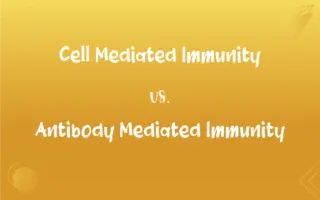Not Guilty vs. Innocent: What's the Difference?
Edited by Aimie Carlson || By Janet White || Published on March 12, 2024
"Not guilty" is a legal verdict stating lack of proof for conviction, while "innocent" implies absence of any wrongdoing.

Key Differences
Not guilty and innocent are terms often used interchangeably but have distinct meanings, especially in legal contexts. Not guilty is a formal legal verdict indicating that there isn't enough evidence to convict the accused of the charges against them. It does not necessarily imply that the person is innocent of the crime, merely that their guilt could not be established beyond a reasonable doubt. Innocent, on the other hand, signifies that a person did not commit the crime or wrongdoing they were accused of. It's a broader term that denotes a lack of culpability or involvement in any criminal activity. While all innocent people are not guilty of the crime they were accused of, not all people found not guilty are necessarily innocent of the charges.
The distinction between not guilty and innocent is crucial in the legal system. Being found not guilty means the prosecution has failed to meet its burden of proof, not that the defendant has proven their innocence. The presumption of innocence until proven guilty underpins many legal systems, emphasizing that the burden of proof lies with the prosecution, not the defense.
Proving innocence often requires a positive demonstration that the accused did not commit the crime, which is not a requirement for a not guilty verdict. In some cases, evidence may emerge after a trial that conclusively proves an individual's innocence, which can lead to exoneration.
This distinction emphasizes the gap between legal judgments and factual innocence. A not guilty verdict might leave unresolved questions about what actually happened, while a declaration of innocence (often more common in the court of public opinion than in courtrooms) suggests conclusive evidence that the accused did not commit the alleged act.
Comparison Chart
Legal Definition
Verdict indicating insufficient evidence for conviction
State of not having committed a crime
ADVERTISEMENT
Implication
Absence of proof beyond a reasonable doubt
Absence of wrongdoing or culpability
Required Proof
Prosecution fails to prove case
Evidence may suggest complete lack of involvement
Perception
Focuses on the trial process
Focuses on the moral or factual status
Outcome
Does not prove innocence
Implies no participation in the crime
Not Guilty and Innocent Definitions
Not Guilty
Legal status where accused is not convicted.
After the trial, he was declared not guilty and released from custody.
ADVERTISEMENT
Innocent
Not involved in a crime.
Witnesses confirmed that the accused was innocent and elsewhere at the time of the crime.
Not Guilty
Outcome of a criminal trial favoring the defendant.
She breathed a sigh of relief when the judge pronounced her not guilty.
Innocent
Unaffected by malice.
The child's innocent question caught everyone off guard.
Not Guilty
Verdict indicating lack of sufficient evidence for conviction.
The jury returned a verdict of not guilty due to lack of evidence.
Innocent
Lacking knowledge of evil or wrongdoing.
Her innocent demeanor belied a sharp intellect.
Not Guilty
Indicates the prosecution did not meet its burden of proof.
The not guilty verdict underscored the prosecution's failure to prove their case.
Innocent
Morally blameless.
Despite the accusations, he maintained his innocent stance.
Not Guilty
A judicial declaration absolving someone of legal blame.
Being found not guilty, he walked out of the courtroom a free man.
Innocent
Free from guilt or wrongdoing.
The evidence clearly showed the suspect was innocent of the charges.
Innocent
Uncorrupted by evil, malice, or wrongdoing; sinless
An innocent child.
FAQs
Does not guilty affect future legal actions?
A not guilty verdict prevents retrial for the same offense under double jeopardy laws.
How can someone prove their innocence?
By providing evidence that conclusively shows they did not commit the crime.
What does a not guilty verdict mean?
It means there was not enough evidence to convict the accused beyond a reasonable doubt.
What happens after an innocent verdict?
There is no "innocent" verdict in legal terms; however, evidence proving innocence can lead to exoneration.
How does public perception differ between not guilty and innocent?
"Innocent" often carries a connotation of moral or factual exoneration, whereas "not guilty" is seen as a legal judgment.
Can someone be not guilty but not innocent?
Yes, not guilty means lack of proof for conviction, not necessarily absence of wrongdoing.
Is innocent the same as not guilty in legal terms?
No, innocent implies no wrongdoing, while not guilty refers to a specific legal verdict.
Can a not guilty person still be civilly liable?
Yes, they can be found not guilty criminally but still liable in a civil lawsuit.
Are there legal mechanisms to clear one's name after a not guilty verdict?
Yes, expungement laws can sometimes clear a person's record, reflecting a lack of conviction.
Is it possible to be declared innocent after being found not guilty?
Legal systems typically do not declare someone "innocent," but new evidence can support their factual innocence.
What role does the presumption of innocence play in not guilty verdicts?
It ensures the accused is treated as innocent until proven guilty beyond a reasonable doubt.
Can media portrayal affect the distinction between not guilty and innocent?
Yes, media can influence public perception of guilt or innocence regardless of the legal verdict.
Can new evidence after a not guilty verdict change the outcome?
New evidence can support innocence but not lead to a retrial under double jeopardy.
Can someone found not guilty sue for false accusation?
Depending on jurisdiction, they might sue for malicious prosecution or defamation.
How do different legal systems handle the concepts of not guilty and innocent?
Legal systems vary, but the presumption of innocence until proven guilty is a common principle.
How do wrongful convictions relate to not guilty and innocent?
Wrongful convictions occur when someone innocent is found guilty, highlighting the importance of these distinctions.
How does society view not guilty versus innocent individuals?
Society may view not guilty individuals with suspicion, whereas those proven innocent are more likely to be seen as wrongfully accused.
Does being found not guilty mean you can never be tried again for the same crime?
Generally, yes, due to double jeopardy protections.
What is the burden of proof for a not guilty verdict?
The prosecution must prove the accused's guilt beyond a reasonable doubt.
What implications does a not guilty verdict have for the accused's record?
It can still appear on criminal records, potentially affecting future opportunities.
About Author
Written by
Janet WhiteJanet White has been an esteemed writer and blogger for Difference Wiki. Holding a Master's degree in Science and Medical Journalism from the prestigious Boston University, she has consistently demonstrated her expertise and passion for her field. When she's not immersed in her work, Janet relishes her time exercising, delving into a good book, and cherishing moments with friends and family.
Edited by
Aimie CarlsonAimie Carlson, holding a master's degree in English literature, is a fervent English language enthusiast. She lends her writing talents to Difference Wiki, a prominent website that specializes in comparisons, offering readers insightful analyses that both captivate and inform.







































































